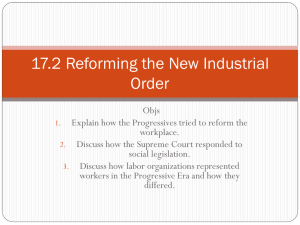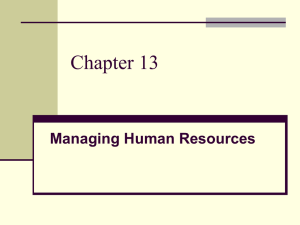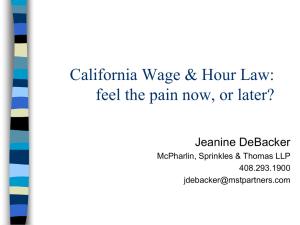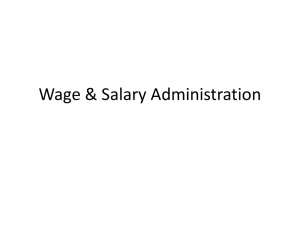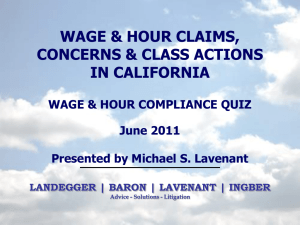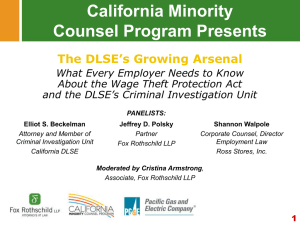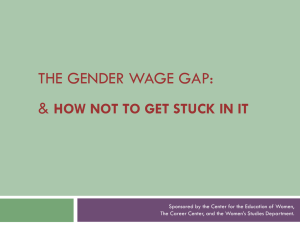Update on Wage and Hour Issues and Payroll
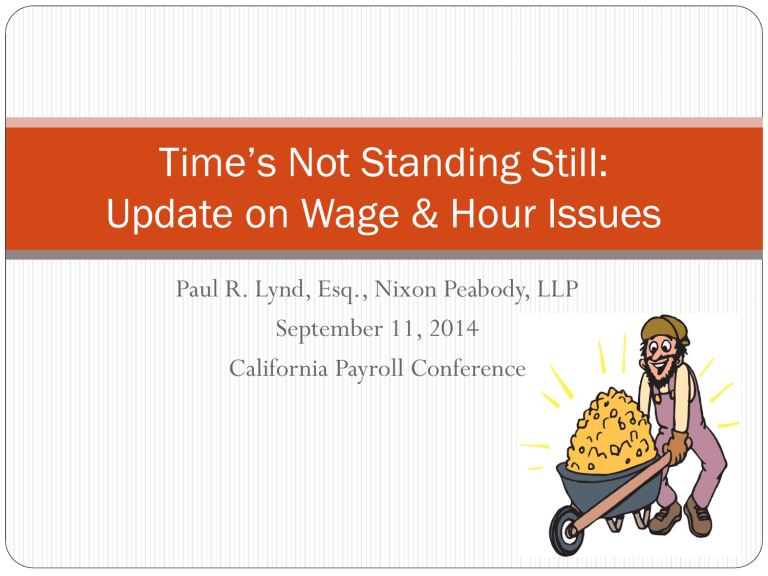
Time’s Not Standing Still:
Update on Wage & Hour Issues
Paul R. Lynd, Esq., Nixon Peabody, LLP
September 11, 2014
California Payroll Conference
Class Action Update
Wage and hour class actions are still going!
Different claims in cases, but same ones, too
Class action waivers in arbitration agreements are OK in
California, but not with Labor Code Private Attorney General
Act claims (Iskanian v. CLS Transportation, 59 Cal.4th 348 (2014))
California courts still wrestling with certification
California Supreme Court tried again to clarify what’s important for whether common issues allow class certification
(Ayala v. Antelope Valley Newspapers, 59 Cal.4th 522 (2014))
Minimum Wage Issues
Continue on Many Levels
Federal proposal to raise federal minimum wage to $10.10 from current $7.25. It’s gone nowhere.
Executive order raised to $10.10 for federal contractors on new contracts or replacement contracts. Did not change much.
Local cities enacting own minimum wages
San Francisco’s minimum wage now $10.74 an hour as of
January 1, 2014 – up from $10.55
San Jose’s minimum wage now $10.15 after annual hike
California Minimum Wage Issues
California minimum wage increased to $9.00 per hour on
July 1, 2014
By law, state minimum wages increases again to $10.00 per hour on January 1, 2016
What is not happening: Another increase is off for now! SB
935 failed, which would have imposed more increases and automatic annual increases.
Don’t be surprised if the Legislature revisits the issue again next session.
What Else Changes with California
Minimum Wage Increase?
Increase in California minimum wage changes the minimum salary for administrative, executive, and exempt employees
Now is $3,120 per month, or $37,440 per year
In 2016, minimum salary will increase to $3,466.67 per month or $41,600 per year
These minimums must be met through salary only, not total compensation
Minimum for commission pay exemption employees is now
$13.50 per hour and will be $15.00 per hour in 2016
End of Minimum Wage and Overtime
Exemptions for Some Employees
California ended minimum wage exemption for “personal attendants” effective January 1, 2014
Contrary to reports, did not end for all domestic employees
Issue to be studied further in California
Federal minimum wage and overtime exemptions ending
January 1, 2015 for caregivers
Federal Overtime Exemption Review
In March 2014, President issued Presidential Memorandum directing the U.S. Department of Labor to review federal overtime rules under the Fair Labor Standards Act
Stated goal is “updating and modernizing” the rules
DOL last did so in 2004
Told to revisit federal minimum salary rule of $455 per week
Review of duties for exemptions likely
No proposals emerged yet, probably nothing until 2015
San Francisco’s New “Family Friendly
Workplace Ordinance”
Amended effective February 14, 2014 to clarify law applies to any employee with 20 or more employees “regardless of location”
Covers employees who have worked at least six months and regularly work at least 8 hours a week
Employee may request “flexible working arrangement” to assist with caregiver responsibilities, including changes in times worked, number of hours, and location
Further such proposals likely on different levels
Other New 2014 California
Laws of Note
SB 390: Misdemeanor (year in jail and $1,000 fine) for employer not remitting wage withholdings
SB 462: Prevailing employer no longer entitled to automatic fee award on wage lawsuit. Now, award only if employee brought suit in “bad faith.”
SB 435: Heat “recovery period” rest breaks of at least five minutes for outdoor employees, or pay hour’s wages
New leave rights for victims of stalking, domestic violence, sexual assault, and crime victims
Oral or written complaints to employer about wages now protected from retaliation
A California Law that Won’t Be Happening
AB 1164: California Fair Paycheck Act
Bill would have allowed a lien on employer’s property for wages, compensation, related penalties and damages, interest, and costs of lien
Would have been permitted on all property of the employer, including property acquired later
Take mechanic’s lien idea and expands it significantly
Bill died at end of legislative session.
Coming Up: Mandatory Paid Sick Days
AB 1522, the Health Workplaces, Healthy Families Act of
2014, signed into law on Sept. 10.
Requires employers provide paid sick leave
Employees could use the sick leave to care for certain family members (parent, child, spouse, domestic partner, grandparent, grandchild, sibling)
Paid at the same rate as regular wage rate, in pay for that pay period.
Employee may use up to three days a year.
Wage statements must give available balance. Poster, wage disclosure statement also required.
Paying Final Wages
McLean v. State of California, 2014 Cal. App. LEXIS (Aug. 19,
2014)
Definition of “quits” includes to “retire” for timing of wage payment purposes
Under Labor Code section 202, employer has up to 72 hours to pay when resignation without notice. If gave enough notice, final wages due immediately.
Reminder: Mailing permitted only if employee quits without notice and requests mailing, with an address
Otherwise, hold check for pick up or instruction by former employee.
Cell Phone Expense Coverage
Cochran v. Schwan’s Home Service, Inc., 228 Cal.App.4th 1137
(2014)
Employer must cover all work-related cell phone expenses
Rule applies even if employee has an unlimited plan, in which case additional work calls would not have added to the bill
California law ordinarily requires covering the actual expenses.
If an unlimited plan, employer “must pay some reasonable percentage of the employee’s cell phone bill”
Not Reimbursing Expenses:
Other Consequences?
Vasquez v. Franklin Management Real Estate Fund, Inc., 222
Cal.App.4th 819 (2013)
Labor Code section 2802 requires expense reimbursement
Employer would not pay mileage, kept assigning driving, and employee quit
Can sue for constructive discharge in violation of public policy:
Not a “typical case,” but an “untenable position” here and would have made less than minimum wage
Cannot sue for intentional infliction of emotional distress but can file worker’s compensation claim
Partial-Day Absences and Exempt
Employees
Rhea v. General Atomics, 227 Cal.App.4th 1360 (2014)
California follows federal rule for deductions from paid leave for exempt employee’s absences
Conley v. PG&E, 131 Cal.App.4th 260 (2005) upheld policy of deducting from paid leave when absence was at least four hours
General Atomics held that there is no minimum required for deduction from paid leave
Remember: Deductions from salary are different, and generally allowed only if for a full-day absence.
Minimum Pay Must Be
“Salary” to Be Exempt
Negri v. Koning & Associates, 216 Cal.App.4th 392 (2013)
Pay was $29 per hour
No fixed guarantee, so not a “salary”
Law requires a “salary,” which is a fixed, predetermined, guaranteed amount, not subject to deduction
The “salary” also is not based on “pay” or “compensation” in total
No salary, so not exempt
If “salary” requirement or minimum not met, duties don’t matter and not exempt!
Simultaneous Exempt and
Non-Exempt Duties = Non-Exempt
Heyen v. Safeway Inc., 216 Cal.App.4th 795 (2013)
Former assistant manager, claimed spent majority of time bagging and stocking
Safeway claimed she was “simultaneously” managing
Court found “some intuitive appeal” to Safeway’s argument, but
California law won’t recognize
Federal law different, recognizing “head and hands” work simultaneously in Burger King cases
Timing Is Everything in Paying Commissions
Peabody v. Time Warner, 59 Cal.4th 662 (2014)
Commission pay exemption requires that half of an employee’s pay be commission, and that pay be at least 1.5 times state minimum wage for all hours
California Supreme Court held that commissions must be paid each pay period to measure the exemption. Employer cannot spread commissions paid over a larger period
Important holding in case: Regardless of exemption,
“commissions” must be paid at least twice a month, not monthly!!!
Interview Pay
Gunawan v. Kforce Inc., 2014 U.S. Dist. LEXIS 17873 (C.D.
Cal. Jan. 30, 2014)
A Nixon Peabody case
Plaintiff sought to be paid minimum wage for time spent interviewing for initial assignment
Court dismissed potential class action, holding that “applicant” not an “employee” entitled to pay
Betancourt v. Advantage Human Resourcing, 2014 U.S. Dist. LEXIS
123504 (N.D. Cal. Sept. 3, 2014) reach opposite conclusion.
Paying Wages with Paycards
Gunawan v. Kforce Inc. also addressed a paycard claim
Paycards usually challenged under Labor Code section 212 and
213
Gunawan court held that employee has no private right of action to sue under Labor Code sections 212, 213, 221, and 223
Civil penalties claim under Labor Code Private Attorney
General Act (PAGA) still possible
Holak v. Kmart Corp., 2012 U.S. Dist. LEXIS 176331 (E.D. Cal.
Dec. 12, 2012)
Paycards need to be voluntary, among other things
Inadequately Funded
Contract Liability
Hawkins v. TACA Intern. Airlines, S.A., 223 Cal.App.4th 466
(2014)
Labor Code section 2810 imposes liability for a contract where entity “knows or should know” contract does not have sufficient funds to comply with law
Applies with construction, farm labor, garment, janitorial, security guard, and warehouse contractor
Cannot simply use “a pair of scissors and a paste pot” to draft a lawsuit, but must see and allege contracts
Important: Admission security company “has the ability to pay,” means contract was not underfunded
Arbitration Agreement Can
Bar Labor Commissioner Claim
Sonic Calabasas A, Inc. v. Moreno, 57 Cal.4th 1109 (2013)
2011 decision prohibited waiving Labor Commissioner hearing, allowed arbitration in lieu of trial de novo
U.S. Supreme Court told court to reconsider
Now: If covered by Federal Arbitration Act, agreement can require arbitration instead of a Labor Commissioner hearing
Careful on Appealing Labor
Commissioner Award into Court
Palagin v. Paniagua Construction, Inc., 222 Cal.App.4th 124
(2013)
Timely bond or undertaking is “a condition to” filing appeal
Court lacks jurisdiction otherwise; it cannot extend deadline
Amendment to Labor Code section 98.2 overturned 2006
Progressive Concrete decision
Court ruled in favor of employer, who likely would have avoided $80,000 award if it had been timely
The Labor Commissioner
Took Too Long, But Wait. . .
American Corporate Security, Inc. v. Su, 220 Cal.App.4th 38
(2013)
Labor Commissioner found violation of Labor Code section
98.6 . . . 3 years later!
Demand letter insisted employer offer reinstatement, plus pay
$86,000 in backpay and $13,000 in interest
Employer filed writ petition. Court said must wait to raise defense in enforcement lawsuit filed by Labor Commissioner.
Tip Pooling Held OK
Avidor v. Sutter’s Place, 212 Cal.App.4th1439 (2013)
Earlier case held no private right of action under Labor Code section 351, which declares tips the property of employee
Mandatory tip pool of a “drop” per hour
Court rejected unfair competition and conversion claims
Mandatory tip pooling ok under California law, as long as employer’s “agent” not included
Customer intent not relevant
Be careful of federal law
California’s Piece Rate Problem
Labor Code section 200(a) defines “wages” as including “all amounts for labor performed by employees of every description, whether the amount is fixed or ascertained by the standard of time, task, piece, commission basis, or other method of calculation.
Wage orders have the same definition
California’s
Minimum Wage Complication
Section 4(A) of the wage orders requires pay at the minimum wage “for all hours worked”
What does “all hours worked” mean?
As long as the total pay exceeds the minimum wage for all hours worked, is it legal?
Yes, but not in California
The Federal Rule
Federal law requires minimum wage “in any work week”
Federal law permits averaging
Medrano v. D’Arrigo Bros. Co. of California, 336 F.Supp.2d 1053
(N.D. Cal. 2004) held California follows federal rule
Settled issue?
What Time Must Be
Paid as “Hours Worked”
Two parts to definition in wage orders, either: (1) the time during which an employee is “subject to the control of an employer,” or (2) “all the time the employee is suffered or permitted to work, whether or not required to do so”
“Control” interpreted by courts to mean whether the employee can use “the time effectively for his or her own purposes,” Morillion v. Royal Packing Co., 22 Cal.4th 575
(2000)
What Other Time Could
Have to Be Paid?
Meeting time
Training
Controlled waiting time
Preparation time at the start
Cleaning up time at the end of day
Travel during the day
Items taken home for work
Exercise time
What About Paid Rest Periods?
Wage Orders require paid rest periods of at least 10 minutes
“Authorized rest period time shall be counted as hours
worked for which there shall be no deduction from wages”
New heat “recovery period” breaks for cool down?
Ontiveros v. Zamora
, 2009 U.S. Dist. LEXIS
13073 (E.D. Cal. Feb. 20, 2009)
Auto mechanics paid a piece rate for repairs
Not paid separately for meetings, training, setting up work stations, and rest breaks
Employer claimed “necessary and integral” to piece work tasks, so paid by piece rate
Court disagreed, holding that all activities must be paid separately, no averaging
Cardenas v. McLane Foodservices, Inc.
, 796
F.Supp.2d 1246 (C.D. Cal. 2011)
Drivers paid for number of cases delivered, miles driven, or stops
Not paid separately for pre- and post-shift activities
Rejected averaging, and claim that activities “integral and necessary”
Clear holding: “a piece-rate formula that does not compensate directly for all time worked does not comply with California
Labor Codes, even if, averaged out, it would pay at least minimum wage for all hours worked”
Rejected declarations from employees saying they understood piece rate compensated for everything
Quezada v. Con-Way Freight, Inc.
, 2012 U.S. Dist.
LEXIS 98639 (N.D. Cal. July 11, 2012)
Drivers paid piece rate by the mile, but also hourly rate for loading and unloading time
Not paid separately for pre- and post-trip inspection time, or for the first hour of waiting time
Court held cannot build in time for these activities into piece rate, must pay separately
If performing a task that prevents someone from earning piece rate, must be “directly compensated for that time.”
Balasanyan v. Nordstrom, Inc.
, 913
F.Supp.2d 1001 (S.D. Cal. 2012)
Retail employees’ time included 30 minutes of daily stocking assignments, and over 40 minutes of pre-opening and postclosing work
Could not average time to cover activities when commissions could not be earned
Holding: “employees must be directly compensated at least minimum wage for all time spent on activities that do not allow them to directly earn wages.”
Did not matter if employees signed agreement, because not lawful
Case settled for $7.5 million.
Enter the California Courts:
Gonzalez v. Downtown L.A.
Motors
, LP, 215 Cal.App.4th 36 (2013)
Auto mechanics again
Paid piece rate per repair, with no separate pay for waiting time between customers, getting parts, cleaning workstations, meetings, travel between locations, and reviewing service bulletins
Held averaging not allowed, separate pay required for nonrepair tasks
Employer’s “minimum wage floor” did not save it
Bluford v. Safeway Inc., 216
Cal.App.4th 864 (2013)
Drivers paid piece rate for trips, hourly rate for other things
Rest breaks not paid separately, but Safeway claimed “part of the overall piece-rate compensation”
Court held this averaging not allowed
Conclusions: “a piece-rate compensation formula that does not compensate separately for rest periods does not comply with
California’s minimum wage law”
Also: an employer “is precluded from building compensation into its mileage rates for rest periods”
What Is the Potential Liability?
Unpaid wages due at either minimum wage or employee’s usual pay rate
Liquidated (or doubled damages) on a minimum wage claim
Waiting time penalties of 30 day’s wages for former employee
Possible civil penalties
Attorney’s fees
What to Do?
Is it the end of piece rate or commissions only as base pay?
Likely, there will be much less.
Evaluate whether you have any uncompensated time, with piece rate, commissions, or not
If keeping piece rate or commissions only, find a way to track and pay separately other time not covered by piece rate
Is there a need to track rest periods to pay them correctly?
Probably so.
How to handle wage payment statements if paying for time separately?
Watch Out for These Recurring Issues
that
Still Drive Claims and Lawsuits
Regular rate: Is everything included?
Itemized wage payment statements: Is everything there? Are the inclusive dates listed?
Semi-monthly pay periods: Are you always paying the same to non-exempt employees?
Deduction authorizations and final pay
Frequency of commission pay
Seating issues: Still in the hot seat
Meal and rest period issues
Presenter
Paul R. Lynd, Esq.
Nixon Peabody LLP
San Francisco, CA
415-984-8235 plynd@nixonpeabody.com
—
Partner, Labor and Employment group
—
Represents a diverse group of clients in litigation in federal and state courts, as well as before administrative agencies
—
General employment matters, with an emphasis on wage and hour issues.
—
Advice and strategy, development and revisions of policies and plans, litigation prevention and defending employers in individual claims and class actions, leave and reasonable accommodation issue.
—
Published California and federal decisions on important wage and hour issues involving bonus plans and class certification issues.

